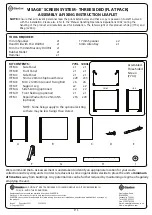
Chapter 5
Operations — Projecting with MIRRORING input
182 - ENGLISH
Projecting with MIRRORING input
By using the mirroring function, the screen of the Miracast compatible device can be displayed as a projected
image.
f
To use the mirroring function, it is necessary to attach the optional Wireless Module (Model No.: ET-WM300).
For details on how to attach the optional Wireless Module (Model No.: ET-WM300), refer to “Attaching the
Wireless Module” (
x
page 51).
Connecting the device
1) Press the <NETWORK/USB> button to switch the input to MIRRORING.
f
Every time the <NETWORK/USB> button is pressed, the input will switch in the order of MEMORY
VIEWER, Panasonic APPLICATION, and MIRRORING. Press the <NETWORK/USB> button until the input
switches to MIRRORING.
f
The standby screen is displayed once the input is switched to MIRRORING.
Receiving device name
2)
Search the display device that can be connected on the Miracast compatible device, and select this
projector and connect it.
f
Confirm the receiving device name displayed in the standby screen, and select the device name
corresponding to this projector from the search result displayed in the device screen.
f
When the [NETWORK/USB] menu
→
[MIRRORING]
→
[CONNECTION TYPE] is set to [PIN], entry of PIN
may be requested at the time of connection. In such case, enter the eight-digit PIN code displayed at the
top of the standby screen.
f
After a while, the screen of the device is displayed as a projected image.
PIN code
Note
f
The operation method may differ depending on the device or the application software in use.
f
For details of connection by the mirroring function, refer to the [NETWORK/USB] menu
→
[MIRRORING] (
x
page 150).
f
The mirroring function cannot be used when the [NETWORK/USB] menu
→
[WIRELESS LAN] is set to [DISABLE].
f
The receiving device name displayed in the standby screen is constructed by the projector name set to the projector and the network ID
unique to the projector.
















































